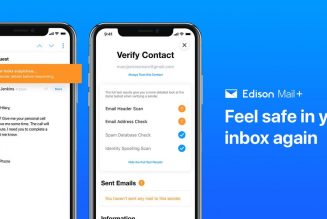
Yesterday, Facebook infuriated the VR world, announcing plans to require a Facebook login for future VR headsets. The decision broke an early promise from Oculus founder Palmer Luckey and was almost universally reviled online, with critics raising concerns about intrusive data collection, targeted advertising, and being forced to use a service they hated. On the Oculus subreddit, some users posted bitter memes about Farmville and data harvesting, while others swapped recommendations for other headsets. One posted a cartoon of Oculus as a sinking ship.
The truth is probably a lot less dire. Facebook-related boycotts fizzle all the time — when it acquired Oculus in 2014, Minecraft creator Markus “Notch” Persson furiously killed a deal to put his game on Oculus Rift, only to be “officially over being upset” months later. (Minecraft was sold to Microsoft and appeared on the Rift soon after its launch.) And Oculus presents plenty of other benefits that could overcome skeptics’ distaste.
But Facebook is also stoking controversy during a deep scrutiny of its acquisitions and privacy practices. Even if its decision works for many users, it’s causing real concern particularly at the margins of VR — a small industry where the margins really matter.
There’s one major argument against a mass Oculus exodus: while yesterday’s change causes problems for a small group of headset owners, many won’t notice much difference. Facebook has real privacy issues, and VR produces vast amounts of data about your movement and surroundings. But Facebook already owned that data. Facebook can see if you’re using a Facebook and Oculus account from the same IP address, whether or not they’re linked. Buying any Oculus app with a credit card requires sharing as much sensitive data as a bare-bones Facebook profile. If you’re a home VR user, Facebook is just spotlighting a privacy trade-off people have been making for years.
Despite a wave of posts about people selling their Oculus Quest headsets, the odds seem stacked against a consumer revolt. There’s no mass deactivation to focus anger into coordinated action, since separate accounts will work until 2023, although Oculus says “all future unreleased devices” will require a Facebook account. The change apparently doesn’t affect Oculus for Business customers either, and businesses are a bigger and more stable market than consumers.
What about developers? Oculus needs popular apps to attract users, and some designers say forced Facebook integration is a deal-breaker. “I deactivated my Facebook account earlier this year, and don’t plan on devving for Quest / Oculus ever again,” Blarp! creator Isaac Cohen (who works under the name Cabbibo) told me on Twitter after the announcement.
But dropping Oculus is a serious sacrifice. Developers need the biggest audience they can get, which means releasing across all VR platforms. Oculus is one of a few companies backing VR game development at a large scale. The standalone Oculus Quest is one of VR’s most popular headsets — and with good reason, given its versatility, solid design, and robust catalog of Facebook-owned games. As Ben Kuchera of Polygon writes, the Quest is “great video games and great hardware … owned and controlled by the one company I would want to keep as far away from the technology as possible.”
Facebook has weathered bigger furors over clearer harms, including the Cambridge Analytica scandal’s #DeleteFacebook campaign and an advertiser boycott over hate speech. Add this to all the factors above, and it’s highly plausible that the login controversy will blow over.
But Oculus is also more vulnerable than Facebook as a whole. Facebook is an incredibly sticky and ubiquitous service; it mediated the jobs, social lives, and relationships of 2.5 billion people in early 2020. Oculus headset numbers are scant, but they’re estimated in the millions, toward the top of a very small market. The company’s success still hinges on having the best hardware and software experience, not just an overwhelming incumbent advantage.
Oculus’s competitors have seized on this controversy. HTC’s Vive Twitter account jumped into the Oculus announcement thread and pitched the Vive Cosmos headset to angry VR fans. Joanna Popper, HP’s head of VR, boasted that the upcoming Reverb G2 would be “no Facebook account needed.” Oculus competitors like Valve, which runs a cross-platform storefront, can earn money off almost anybody with a PC headset. But the Oculus Store is Rift- and Quest-only, so every hardware sale it loses is a lost software customer as well.
If Facebook is extremely unlucky, this controversy puts Oculus in regulators’ crosshairs. Lawmakers have questioned Oculus’s privacy policies before, and investigators are currently poring over past Facebook acquisitions for evidence that the company is abusing its power and collecting unconscionable amounts of user data. There’s also a newfound enthusiasm for splitting up tech giants. Spinning off a VR headset division is probably low on reformers’ priority list, but rousing data privacy fears around an acquired company doesn’t exactly help Facebook.
Oculus is a small part of Facebook: even after the company’s non-advertising revenue spiked in early 2020, that money equaled less than 2 percent of its ad revenue. But VR enthusiasts worry that a backlash could shrink the whole industry.
Requiring Facebook integration hurts extremely privacy-conscious users that avoid the Oculus Store, and it removes a formal layer of data separation that many people (including me) appreciate. Facebook is making yet-unexplained privacy policy changes too. Facebook will be fine if a few thousand alienated Quest owners stop buying software, but even small losses could knock out indie developers with razor-thin margins. The Quest is one of the only headsets that doesn’t require a gaming PC or console, and even if HTC or Sony nab some disillusioned would-be Oculus hardware customers, others may just decide to stay away.
Facebook integration also makes non-personal Quest use more difficult. “My own Facebook gripes aside, this is a practical nightmare for those of us who administer shared devices in schools and libraries,” wrote Northwestern University Knight Lab member Rebecca Poulson on Twitter. An Oculus spokesperson says organizations can use Oculus for Business and implement their own login systems. But the more inconvenient using a headset becomes, the more likely these niche user bases will wither — and in the current VR industry, every headset counts.
Facebook’s login change is especially frustrating because it seemingly offers users so little. People who want Facebook-specific features can already get them. Some headset owners buy deeply into the platform’s full ecosystem, but others rely on third-party stores like Steam, and this change only antagonizes them. Facebook says centralization will help create a simpler moderation process, but it’s not clear why that can’t be streamlined internally instead.
In its announcement, Facebook said the majority of Oculus users already log in with a Facebook account. So it may be worth the backlash to encourage greater social engagement or avoid maintaining two separate account systems. But it’s also one of the persistent reminders that Oculus’s success — achieved at least partly with Facebook’s money and connections — has come at a cost. If you love Facebook, Oculus headsets are already built for you. If you hate Facebook, Oculus just made its single worst feature almost impossible to avoid.










